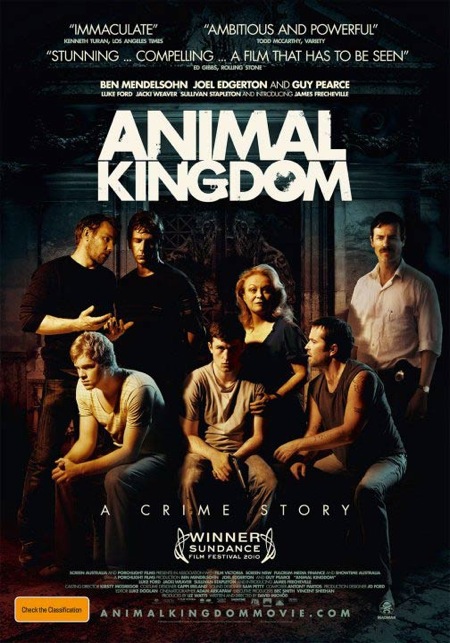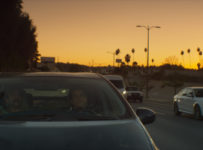Animal Kingdom is out in Australian cinemas today.

Australia. It’s a tough country to nail down, because so many of us hate the image that we project. It’s called the “cultural cringe”. No one in Australia goes to see Australian films; if you talk about a movie and then say that it’s Australian, your audience quickly loses interest.
There is something utterly uncompelling about the promotion of our films that a lot of people don’t get through the door to find out if something is worth watching. Of course, it was not always like this. And it doesn’t always have to be like this.
Animal Kingdom is a magnetic movie. From its first trailer, featuring a home invasion set to Air Supply’s “All Out of Love”, I knew that I had to see it. A more conventional trailer only cemented that thought. The fact that it won at Sundance didn't hurt, either.
Suddenly Animal Kingdom had done what Beneath Hill 60 with its appeal to jingoism and I Love You, Too, with its appeal to the Peter Dinklage fanbase, had resolutely failed to do: it got me excited to see an Australian movie.
In an industry where apathy is the killer, where it’s easier to go to Transformers than it is to make an informed decision, where they let Robin Hood open Cannes, to set off someone’s radar means something.
Through no fault of Animal Kingdom, I had come to expect it as some sort of Holy Grail of Australian cinema. It’s pretty good, but it’s not close to sacramental.
J (James Frecheville) moves in with his grandmother, “Smurf” (Jacki Weaver), after his own mother dies of a heroin overdose. J quickly discovers that his is a family of criminals, and is almost immediately involved in a war of attrition between his uncles and the police force.
Animal Kingdom is not an easy movie, largely because at no point did I have any idea what it was supposed to be about or what it was working towards. It’s not twisty, but rather ambiguous. The thing about the film is that it improves upon introspection, as you slot it together after the fact.
I’ve seen that at least one person has worried that Animal Kingdom won’t be able to find an audience. We live in a nation addicted to crime, with Underbelly attracting attention every week – and it can’t just be for the awful period hair and the copious nudity. Animal Kingdom is less conventionally criminal. As director David Michôd says, it's a crime film in which none of the crimes are committed on screen.
Animal Kingdom is very insular: the police, in the form of Guy Pearce, enter the piece fairly late and until that point had served as nothing but provocateurs.
The family is tight knit but also insane; every member with his own problem, each with Smurf presiding over them, administering rather more physical affection than is normal for a mother with her sons.
Animal Kingdom therefore lives and dies by its performances, which do nothing but cement the idea in my mind that Australia has a large number of very talented actors.
This will sound insulting, but Frecheville plays J with a dull eyed, disinterested idiocy. As J, he seems almost to have an intellectual disability. Having since seen Frecheville in real life, having seen he looks like a normal person, this is testament to the strength of his portrayal of a kid who’s never been given a chance. The ambiguity of J's supreme density plays very well into the hands of the other characters, all of whom are surprisingly unique: from Joel Edgerton's relatively straitlaced Barry and Luke Ford's downtrodden Darren to Sullivan Stapleton's perpetually wired Craig and Ben Mendelsohn's manic and sinister Pope.
It would be wrong to say that any single actor "makes†this movie, because they are all fantastic. Stapleton and Mendelsohn are clear standouts, Mendelsohn in particular because he is utterly unpredictable and entirely without conscience. You come to hate him almost immediately, but he can still make you laugh through his combination of pathos and evil.
The balance of power in the movie keeps shifting until the performance that comes out on top is that of Jacki Weaver, who essentially plays "your friend's motherâ€. Imagine the nice friend of your mother; imagine beneath her benign smile the workings of Satan. That is Weaver in this movie, and she plays it so subtly and with so many layers that each revelation is a delight and a shock.
That's the best way to describe what Animal Kingdom does: it delights and shocks to form an almost flawless whole, culminating in one of the most powerful endings I've seen in a film for a long time. The media is making a big deal of saying "we're not saying it's a great Australian movie, we're saying it's a great movie.â€
Animal Kingdom is a great movie, and demands attention. It takes some effort to appreciate, but a lot of the best films are like that … they keep you guessing until the last frame, even if you have no idea what you're supposed to be guessing at.
Disclaimer: Analysis of the Australian film industry is my personal opinion and may not be borne out by research and facts.


Ugh, probably not the best night to go to the movies…. at the same time as the movie marathoners … *shudder*
That being said, the theatre was packed, and I was surrounded by the stereotypical cinema annoyers – the person with the inability to open a chip packet, and the person who “GASPS!” at every freaking gun shot (she also, for the record, had pretty bad flatulence.) Sometimes I hope I sit next to first daters, that way at least you’re saved from the flatulence.
ANYWAYS. Onto the movie.
You were spot on, the choice between blockbuster (Prince of Persia) and australian film was pretty tough. I wanted to go the safe Bruckheimer route. At least you know what you’re in for.
And yes, Aussie film stigma is well and truly alive. I had visions of “Australia” in my mind that just wouldn’t go away.
I absolutely agree with your description of J. Did he get his character’s motivation from I Am Sam? Please, I expected him to at least have a devious brood, not a simpleton brood. By the end of the film I felt like smacking him on the head and screaming “YOU IDIOT!”
However, I guess I can see where his portrayal would stem from, like you say, a kid who has had a pretty tough life. Maybe kids in that situation aren’t the sharpest crayons in the box.
I have to say that Edgerton’s role was played well, but maybe that’s because it was cut short, who knows!? :o